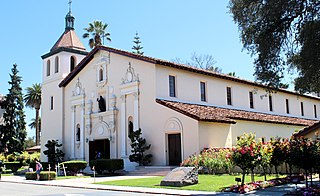
Santa Clara is a city in Santa Clara County, California. The city's population was 116,468 as of the 2010 United States Census, making it the ninth-most populous city in the Bay Area. Located in the southern Bay Area, the city was founded by the Spanish in 1777 with the establishment of Mission Santa Clara de Asís under the leadership of Saint Junípero Serra.
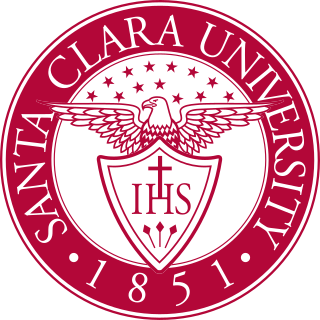
Santa Clara University is a private Jesuit university in Santa Clara, California. Established in 1851, Santa Clara University is the oldest operating institution of higher learning in California. The university's campus surrounds the historic Mission Santa Clara de Asís which traces its founding to 1776. The campus mirrors the Mission's architectural style and is one of the finest groupings of Mission Revival architecture and other Spanish Colonial Revival styles. The university is classified as a "Doctoral/Professional" university by Carnegie Classification.

The Santa Clara County Library District is a public library system headquartered in Campbell, California. The library serves the communities and cities of Campbell, Cupertino, Gilroy, Los Altos, Los Altos Hills, Milpitas, Monte Sereno, Morgan Hill, Saratoga, and all unincorporated areas of Santa Clara County. Other cities in Santa Clara County run their own library systems. In addition to these libraries, the library provides mobile library service with a bookmobile which visits preschools, retirement communities, migrant farmworker camps, and rural communities without easy access to library services. In 2020 SCCLD also launched a new website featuring a 24/7 online library.
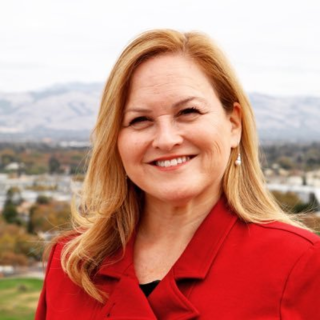
Cindy Chavez is an American politician who serves as the Santa Clara County supervisor representing district two, which is home to nearly 400,000 residents in Downtown, East, and South San Jose. Her public service career began in the 1990s as a policy analyst for health care, public health, human services and transportation for the Board of Supervisors. She served two terms on the San Jose City Council, where she was also Vice Mayor, and also served on the board leadership of public agencies such as the San Jose Redevelopment Agency, and executive director of Working Partnerships USA and the South Bay AFL-CIO Labor Council. She is a graduate of San Jose State University, is married and has a son in high school.

Ken Yeager is an American politician. He served on the Santa Clara County Board of Supervisors, representing District 4. First elected to the board in 2006, he represented the cities of Campbell and Santa Clara, as well as west San Jose and the Burbank and Cambrian neighborhoods. Previously, Yeager served on the San Jose City Council from 2000 to 2006. Before that, he served two terms on the San Jose/Evergreen Community College Board. He was a candidate for the 23rd district seat in the California State Assembly in 1996, coming in second.

O'Connor Hospital is a hospital in San Jose, California, part of the Santa Clara County Health System. Located in the West San Carlos neighborhood of San Jose, O'Connor Hospital is one of the oldest hospitals in Santa Clara County, founded in 1889.

International Technological University (ITU) is a private university in Santa Clara, California. It was founded in 1994 by Professor Shu-Park Chan, previously a professor and interim dean of the School of Engineering at Santa Clara University.
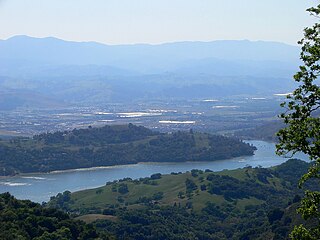
Anderson Lake, also known as Anderson Reservoir, is an artificial lake in Santa Clara County, California, United States, near Morgan Hill. The reservoir is formed by the damming of Coyote Creek just below its confluence with Las Animas Creek. A 4,275-acre (1,730 ha) county park surrounds the reservoir and provides limited fishing, picnicking, and hiking activities. Although swimming is prohibited, boating, water-skiing and jet-skiing are permitted in the reservoir.

Santa Clara Valley Medical Center, commonly known as Valley Medical Center or simply Valley Medical, is a prominent 731-bed public tertiary, teaching, and research hospital in San Jose, California. Located in the Fruitdale neighborhood of West San Jose, Valley Medical Center is the anchor facility of the Santa Clara County Health System, serving Santa Clara County. Valley Medical is home to numerous innovative research and care centers, such as the Rehabilitation Trauma Center, the only federally-designated spinal cord injury center in Northern California.

Santa Clara County, officially the County of Santa Clara, is California's 6th most populous county, with a population of 1,936,259, as of the 2020 census. Santa Clara County and neighboring San Benito County together form the U.S. Census Bureau's San Jose-Sunnyvale-Santa Clara, CA Metropolitan Statistical Area, which is part of the larger San Jose-San Francisco-Oakland, CA Combined Statistical Area. Santa Clara is the most populous county in the San Francisco Bay Area and in Northern California.

The Santa Clara County Fire Department (SCCFD) provides fire protection and emergency medical services to the county of Santa Clara, California. Established in 1947, the SCCFD is responsible for the unincorporated areas of Santa Clara County as well as the communities of Campbell, Cupertino, Los Altos, Los Altos Hills, Los Gatos, Monte Sereno, and Saratoga.
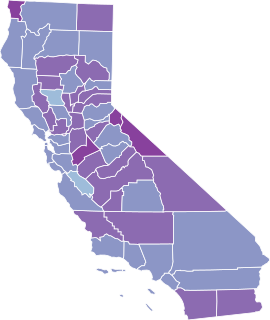
Ten of the first twenty confirmed COVID-19 cases in the United States occurred in California, the first of which was confirmed on January 26, 2020. All of the early confirmed cases were persons who had recently travelled to China, as testing was restricted to this group. On January 29, 2020, as disease containment protocols were still being developed, the U.S. Department of State evacuated 195 persons from Wuhan, China aboard a chartered flight to March Air Reserve Base in Riverside County, and in the process may have contributed to spread within the state and the US at large. On February 5, 2020, the U.S. evacuated 345 more citizens from Hubei Province to two military bases in California, Travis Air Force Base in Solano County and Marine Corps Air Station Miramar, San Diego, where they were quarantined for 14 days. A state of emergency was declared in the state on March 4, 2020 and as of February 24, 2021 remains in effect. A mandatory statewide stay-at-home order was issued on March 19, 2020 that was ended on January 25, 2021. On April 6, 2021, the state announced plans to fully reopen the economy by June 15, 2021.
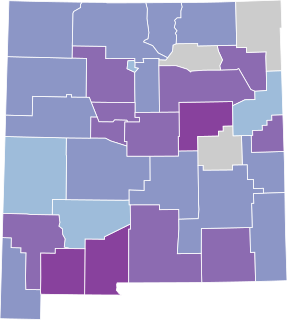
The COVID-19 pandemic was confirmed to have reached the U.S. state of New Mexico on March 11, 2020. On December 23, 2020, the New Mexico Department of Health reported 1,174 new COVID-19 cases and 40 deaths, bringing the cumulative statewide totals to 133,242 cases and 2,243 deaths since the start of the pandemic. During the last quarter of 2020, COVID-19 hospitalizations in New Mexico increased, reaching a peak of 947 hospitalizations on December 3.

During the COVID-19 pandemic, former passengers of the cruise ship Grand Princess who had tested positive for SARS-CoV-2 were being linked to cruises they had taken on the ship while it traveled between California, Mexico, and Hawaii. After the first confirmed death on 4 March 2020, Grand Princess was rerouted to the San Francisco Bay Area, where it was anchored offshore while test kits were airlifted to the ship. Preliminary testing found 21 positive cases, and the ship later docked in Oakland on 9 March 2020, with over 3,000 people entering quarantine.

Sara H. Cody, M.D., is an American doctor, epidemiologist and public health official serving as the health officer and public health director of Santa Clara County, California, at the time of the 2020 COVID-19 outbreak. Her timely implementation of stay-at-home orders in coordination with other San Francisco Bay Area health officials is credited with preventing an estimated 188,000 hospitalizations and 19,000 deaths in major Bay Area cities. Cody continues to maintain a regular presence in the media to communicate COVID-19 news and policy.
The County of Santa Clara Health System is the public healthcare system of Santa Clara County, California. Valley Medical Center, in San Jose, is the flagship hospital of the system. It comprises county-owned hospitals, clinics, health-related county agencies, and a health insurance plan.
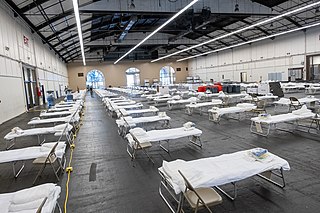
The San Francisco Bay Area, which includes the major cities of San Jose, San Francisco, and Oakland, was an early center of the COVID-19 pandemic in California. The first case of COVID-19 in the area was confirmed in Santa Clara County on January 31, 2020. A Santa Clara County resident was the earliest known death caused by COVID-19 in the United States, on February 6, suggesting that community spread of COVID-19 had been occurring long before any actual documented case. This article covers the 13 members of ABAHO, which includes the nine-county Bay Area plus the counties of Monterey, San Benito, and Santa Cruz.
The following is a timeline of the COVID-19 pandemic in California.

The government of California initially responded to the COVID-19 pandemic in the state with a statewide lockdown, the first of its kind during the COVID-19 pandemic in the United States. As the pandemic progressed in California and throughout the rest of the country, the California government, following recommendations issued by the U.S. government regarding state and local government responses, began imposing social distancing measures and workplace hazard controls.
















